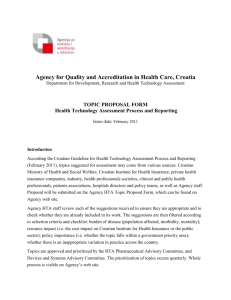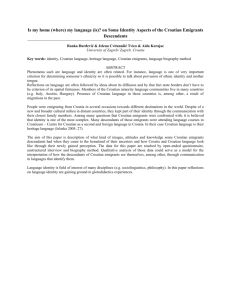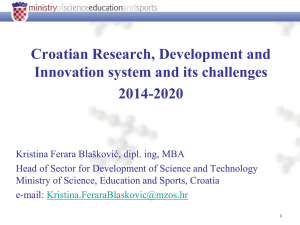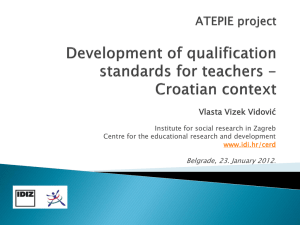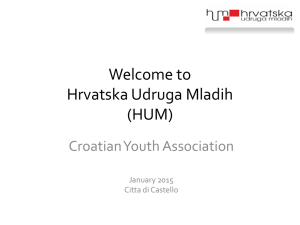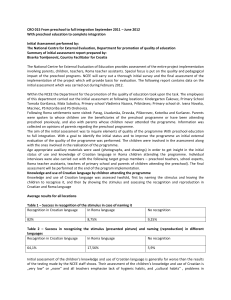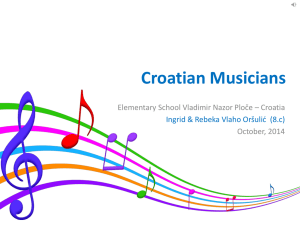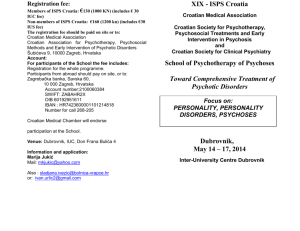The Croatian Way
advertisement
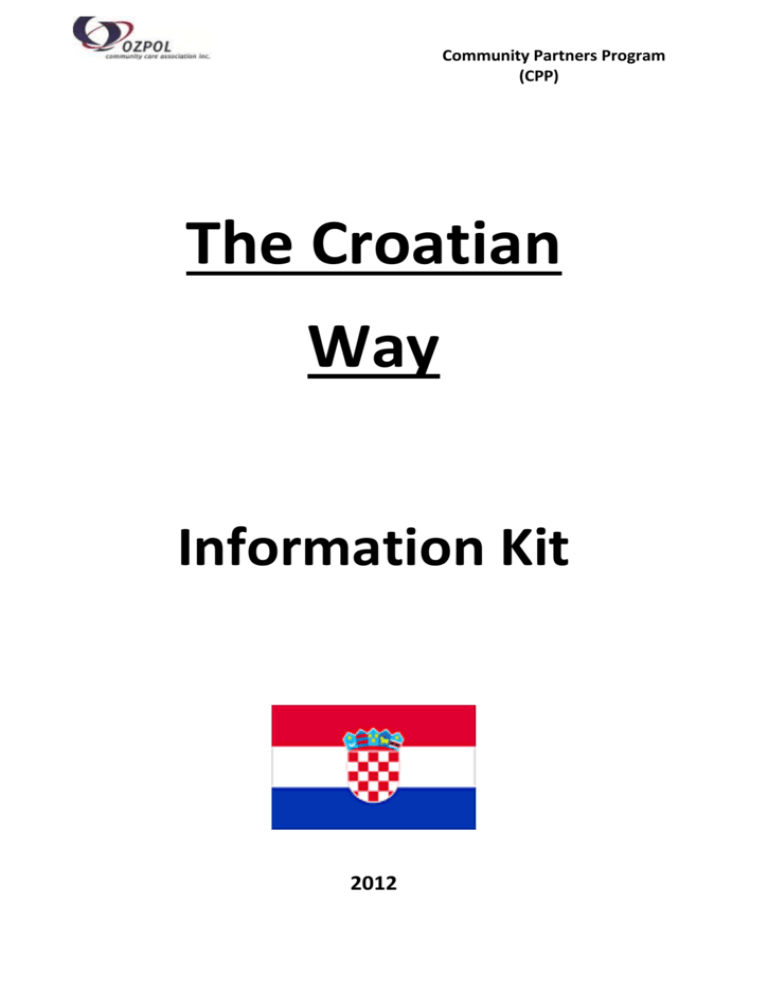
Community Partners Program (CPP) The Croatian Way Information Kit 2012 Community Partners Program (CPP) Information Kit The purpose of this information kit is to provide professionals working with people of Croatian background with practical, up-to-date, accurate information, while its main aim is to assist both the worker and the client. Most problems encountered in daily life are due to miscommunication and we hope that this short guide will facilitate between the various service providers and the 46,510 strong eastern European communities in Queensland. Steering clear of stereotypes, we hope to have dispelled some common myths and misconception. We believe that the information provided within this kit will give you an overview of the Croatian history, customs and various resources which should form a basis for developing better relationships with your clients. Please also remember that, just like in any other ethnic group, each Croatian person is an individual and what might be appropriate for one will not be for another. The best line of action is to always ask questions of the person concerned to find out why they do what they do. We hope you find this information kit useful, your feedback and comments are always welcome. Table of Contents 1. Croatia at a Glance 2. Demographics 3. Migration Trends 4. Croatian Culture and Customs 5. Croatian Language 6. Religion and Tradition 7. Food and Diet 8. Attitudes to Aged Care 9. Working with Interpreters and Bi-lingual Staff 10. Key Issues for the Croatian Community 11. Resource Guide Community Partners Program (CPP) Croatia at a Glance Background Location: Croatia is situated between central and eastern Europe. Its terrain is diverse, containing rocky coastlines, densely wooded mountains, plains, lakes, and rolling hills. Languages: Croatian (South Slavic language, using the Roman script). Area: 56,542 sq. km. land area; 31,067 sq. km. coastal sea area. Population: (July 2008 est.): 4,491,543. Population growth rate (2005 est.): -0.02%. Health (2005 est.): Life expectancy--male 70.79 years; female 78. Capital: (2002 est.)Zagreb (779,145). National Holidays: Labour Day- 1 May, Anti-Fascist Resistance Day-22, Croatian National Day -25 June, Victory Day and National Thanksgiving Day-5 August, Independence Day-8 October Neighbours: The east coast of the Adriatic Sea and shares a border with Serbia, Montenegro, Bosnia and Herzegovina, Hungary, and Slovenia. Climate: Croatia has a mixture of climates. In the north it is continental, Mediterranean along the coast, and a semi-highland and highland climate in the central region. Natural Recourses: Oil, bauxite, low-grade iron ore, calcium, natural asphalt, mica, clays, salt, and hydropower. Ethnic groups: Croat 89.6%, Serb 4.5%, other 5.9% (including Bosniak, Hungarian, Slovene, Czech, and Roma) (2001 census). Religions: Catholic 87.8%, Orthodox 4.4%, Slavic Muslim 1.28%, others 6.52%. Famous people: John Malkovich - Hollywood actor, Eric Bana -actor, Andrija Alesi- builder, Antun Albini – architect, Jogn Blazevic- Business, Ivan Belostenec-Lexicographer, Vatroslav Jaqic – philologist, Milan Kangrga – Philosopher. Community Partners Program (CPP) Demographics In the 2006 Australian Census there were 63,612 Croatian speaking Australians. There are 118,046 Australians of Croatian ancestry living in Australia. Three quarters live in Victoria and New South Wales and in all states they are predominantly concentrated in urban areas. CROATIAN MIGRATION IN QUEENSLAND Before 1971, Croatians numbered 2119 1971 to 2000 increased by 1320 In Queensland, according to the 2006 Census, the 9,991 strong Croatian community lives predominantly in Brisbane (3,047) and the Gold Coast (2,158) with 836 living in Logan. The remainder are found in Cairns 4.5%, Redland 4.2%, Ipswich 2.6%, Maroochy 2.6%, Pine Rivers 2.1%, Caboolture 2.1%, Mareeba 1.8% and others (19.6%) In Queensland, in the 2006 Census, 9,966 claim Croatian ancestry 2,199 Croatians speak Croatian at home. 695 are over the age of 60. Of the Croatian born elderly, 65years and older, 47.8% speak English Not Well or Not at all. Community Partners Program (CPP) Migration Trends Croatia had the greatest emigration rate in the world, after Ireland. The first Croatians arrived in Australia around 1854 during the gold rush era. The largest group of Croatian migrants came from Dalmacia (coastal region). Most of them settled in Victoria in the mining districts and worked in the goldfields. After trying their luck as miners, some of the new arrivals became seamen, fisherman, labourers, storekeepers, farmers and publicans. Some lived for some time in Victoria before moving to other states. Second most populated state for Croatians was NSW. Croatians were attracted to Queensland by the gold rush as well and stayed there for many years. Croatians, who settled in Western Australia prior to 1890, mainly lived in Fremantle, Perth and Albany where they were seamen and farmers. Many were also involved in the wine-making industry. Community Partners Program (CPP) Between 1891 and 1945 the number of Croatian-born migrants increased dramatically, after the discovery of silver-lead deposits in Broken Hill. A large number wrote to their relatives back home and assisted them in their migration to Australia. This was the first large-scale chain migration of Croatians to Australia especially for women, who started accompanying their husbands. These settlers were better organised and founded many Croatian clubs, which supported social and cultural activities. After the Second World War, Croatians left their home for political reasons and to search for a better life. Approximately 44,000 arrived between 1950 and 1960. The post war migrants mainly found employment in factories but many later worked as tradesmen in the building and construction industry. After the latest turmoil in Croatia a new wave of migrants came from the war affected areas. Their poor knowledge of the English language restricted them again to labouring occupations. Culture and Customs Croatians are extremely proud of their heritage and culture and are thus staunch nationalists. They call their country "Our Beautiful Homeland" ("Lijepa naša"), which is also the title of the national anthem. The sense of nationalism comes both from their long and rich culture as well as a legacy of foreign invasion and control. Traditional culture is determined by folk rituals and their importance is expressed by the old folk proverb: “It is better if the village disappears than if custom disappears.” Rituals and customs fostered the awareness of identity and guarantied the survival of the nation. Croatians, as a group, tend to share thoughts and ideas freely and are very friendly. A guest in a Croatian home is warmly welcomed and may be overwhelmed by the outpouring of generosity. Most Croatians enjoy a robust conversation and have a keen sense of humour. Croatians talk of their jobs, politics, health problems and misfortunes as an Australian would of football or cricket. They are very fond of music and joke telling. Folklore plays a key role in preserving the culture. Life experiences are translated into verse, poetic songs, melodies, fairy tales, symbolic rituals, music, dance, costumes, and jewellery. Folksongs and poems often attest to the sentiment and regard between family members. Touch as a form of caring is common among family members and friends, but Croatians may be quite formal with strangers. In formal situations a handshake is considered polite. For some Croatians, alcohol can serve a culturally important function, particularly during social occasions, such as name day or birthday celebrations. The family is still the basis of the social structure. The extended family is the norm and relatives remain quite close with both the mother and the father’s sides. The family provides its members with a social network and assistance in times of need. Even though it is becoming increasingly common for the nuclear family to have its own house, Croatians will take in elderly parents rather than send them to a nursing home. Weekends are considered family time. Few Croatians will allow business concerns to interfere with this important part of their lives. Many Croatian people enjoy taking part in senior citizens clubs which allow the Croatian elderly to communicate their thoughts, feeling and ideas on a deeper level. The Croatian community in Community Partners Program (CPP) Queensland has a number an elderly group which meets usually on a fortnightly basis – and provides a very valuable social support service to the community of older persons, the majority of whom are in their mid70’s and 80’s. Many of these people have lost their ability to speak English due to dementia, and a significant number have never learned to communicate in this language. The Croatian elderly are very practically minded. They want to be involved in creating something useful, slightly challenging and with a defined purpose. Language When the Croatians arrived to the lands of central Europe in the 7th century, they adopted Christianity and with it the Latin script as the principal alphabet of their language. Before this ‘Glagoljica (Glagolitic script) was is use and it was a combination of Old Church Slavonic and the native language of the Croatian people. The Croatian language belongs to the Slavic group of languages and consists of three dialects: Shtokavian, Kajkavian and Chakavian. Shtokavian is the basis of standard Croatian. It is based on the rule “one sound - one letter”. Usually Croatian people have no problem understanding Bosnian or Serbian speaking people. Parts of the Croatian nation are historically and culturally deeply rooted to the territories of the neighbouring Bosnia and Herzegovina, Slovenia, Hungry, Serbia-Montenegro and also Austria, Slovakia, Italy and Romania. Gaining accurate figures for the Croatian community in Australia is difficult because place of birth does not accurately reflect ethnicity. Many Croatians were born in Bosnia and Herzegovina or in other parts of former Yugoslavia and speak the local dialects. When booking an interpreter, it is culturally appropriate to request a Croatian born, Croatian speaking interpreter. This is an important consideration as many clients experienced war trauma and find it difficult to interact with people of other ethnicities from former Yugoslavia. Many elderly Croatians do not have good English proficiency and some have lost their ability to speak English due to dementia. Useful words and phrases English Hello Goodbye Good morning Good afternoon Good evening Yes No Please Thanks My name is… Croatian Bok Do videnja Dobro jutro Dobar dan Dobra vecer Da Ne Molim Hvala Zovem se .. Community Partners Program (CPP) What is your name? How are you? Fine, and you? How much is it? How much does it cost? See you later Sorry Excuse me Kako se zoveš? Kako si? Dobro, a ti? Koliko je to? Koliko to košta? Vidimo se Žalim Oprostite Forms of Address The naming system follows the standard western system i.e. the first or Christian name is followed by the family or married. “Vi” (‘you” is plural) it’s the term used as a polite form of address when an older person is addressed to show respect or when they are not familiar with each other. A friendly and very common greeting among the Croatians is “Bog”, both for “Hi!” and “Bye!” The literal meaning of Bog is – God. (Probably short for “God be with you” There is a distinct difference between the Croatians who are from urban and those with village backgrounds. It is suggested that service providers ask their clients how they wish to be addressed. Older people in Croatia are usually addressed as aunties and uncles by people younger than themselves. They are not used to being called by their Christian names by younger people, or people with whom they are not familiar. However, Croatians who have resided in Australia for many years may feel comfortable to be called by their first name. Religion and Tradition It was Christianity that established true bonds between the Croatians and the developing culture in Europe. Croatian culture was born in the intertwining net of Mediterranean, Central Europe and mostly West European cultures in the north and Italian influence in the coastal region. The Croatians converted to Christianity in the 7th century and thus have for the last 13 centuries been a part of Western civilization and culture. Christianity deeply influenced the spiritual, moral and traditional values of Croatians and it still plays an important social role today. The Catholic Church as the largest Christian community is a leading social force. Traces of ancient Croatian pagan cults (worship of Perun and lesser deities) can still be found today in folk customs and tales. For many, especially the older generation, life revolves around the church and its activities. The clergy is highly respected and involved in various aspects of community life. Croatians especially worship the Virgin Mary, or as they often refer to her “Our Lady”. There are numerous shrines in her honour throughout the areas where Croatians live, but most famous is Marija Bistrica. This church is to the Croats what Lourdes is the French or Fatima to Portuguese or Loretto to the Italians. Community Partners Program (CPP) Another big event in honour of Virgin Mary is “Sinjska Alka” a competition with horse riders throwing spears, aiming to pierce a stationary ring, while riding in a full gallop. After the event a procession through the town that celebrates “Our Lady” is held. Croatians are proud of their culture and celebrate annually cultural, political, historical and religious events. There is a strong correlation between religion, traditions and culture in the Croatian community, especially for the elderly. An important tradition of Catholic Croatians is to abstain from meat every Friday, though custom is slowly diminishing. It is common for Croatians to kiss on both cheeks as part of a greeting. Special Days Easter During Lent no meat is consumed (people over 50 are not obliged to follow this practice). A one hour fast is observed prior to attending mass (water and medication is allowed if the individual is unwell). A carnival is held on the Tuesday prior to the commencement of Lent. Aon Ash Wednesday the majority of Croatians fast. From this day until Easter Sunday there is no singing, music or dancing. Over Easter no work is done, but people attend Church and some traditional craft activities. Traditionally, eggs are painted or dyed. Christmas Christmas is celebrated from Christmas Eve (24 December) until the Epiphany (first Sunday after New Year). On Christmas Eve candles wrapped with ribbons representing the colours of the Croatian flag are lit. These are then placed amid green wheat to form a special display. The presents are taken from under the tree and distributed mainly to the children-while the whole family sing carols. Prior to dining, family members pray together. After Christmas Eve dinner that is traditionally fish (smoked cod ‘the white way’ is a Christmas Eve dish). The family would go to midnight mass. (Ponocka) Christmas day lunch is usually turkey and greased flat pastry called “mlinci”. Lots of small cakes made mainly of nuts would be eaten after Christmas lunch, other members of the extended family would visit on Christmas Day. New Year A big dinner is prepared and family and friends are invited to eat and drink together till midnight, then the countdown begins for the start of the New Year. All the quests then kiss and hug wishing each other a “happy new year”. Presentation of the Lord, blessing of the candles and St Bias Day (blessing of the truths) are noble feasts. These are listed in the liturgical calendar. Food and Diet Croatians cuisine differs between north and the coastal region in the south. In continental part of Croatia, food is influenced by the Hungarian and German/Austrian cuisines. The meals are Community Partners Program (CPP) rich and very filling and can be relatively high in fat. Smoked goods are especially popular, such as smoked sausages, ham, bacon (speck) and smoked ribs. Coastal region, Dalmacia, has dishes that are low in fat. Dalmatian region cooking is based on seafood, olive oil, boiled vegetables with a very light sauce and very heavy wines that are drunk with water (bevanda). ‘Pasticada’ is one of the favourite dishes. These parts have been more influenced by Italian cuisine. It is important to note that the meal times differ from the Australian. Breakfast often consists of bread and savouries (ham soft boiled eggs, cheese, cottage cheese) rather than toast and cereals. Croatian people are usually not in a habit of eating vegemite or peanut butter. The main meal of the day is lunch and is served around 2-3 p.m. it is usually a cooked meal. Favourite dishes would be goulash, ‘paprikas’ (casserole with the liberal use of red paprika), “Sarma” (rolled sauerkraut leaves filled with meat and rice). Barlotty or red kidney beans are cooked with smoked pork ribs. Scrambled eggs (with chives, tomatoes and onion but no milk, Pickled vegetables, such as gherkins, red paprika and sauerkraut are very popular as a winter salad. Other salads are tomatoes with finely sliced onions or chives, radishes, potato salad, lettuce with cream, lemon and sugar dressing. Beef, chicken and pork are strongly preferred over lamb dishes. Curries and hot foods are generally not popular but salt and paprika are used liberally. Widely popular condiments are mustard, horseradish, grated cooked beetroot with or without horseradish in preference to tomato sauce and chutneys. Pumpkin, raw mushrooms, sprouts and Asian greens are not widely used. Neither are vegemite, salted butter, peanut butter, pies, rice. Crusty continental rye bread is preferred over soft Australian sliced bread. Supper is usually light and whatever is left over from lunch can be used as well. The above food preferences are to be regarded as a guideline only, and it is always advisable to ask about personal preferences. As it is the case in most communities, Croatians have varied tastes, likes and dislikes, and one must not assume that we are a homogeneous group. Attitudes to Aged Care Role of the Family in Caring for the Elderly The elderly person generally prefers to stay at home rather than to be admitted into the Age Care Facility. It is expected that family will care for their parents and relatives at home for as Community Partners Program (CPP) long as possible. Extended family ties are especially strong. The elderly are respected and the role of the male as the head of the family tends to be a dominant one. Attitude Towards Residential Aged Care The elderly do not readily accept being admitted into residential care. Generally, this is the option considered only as the last resort. However those Croatians who lived in Australia for a long time have come to accept these services more readily than new arrivals. They respond with appreciation to carers making genuine efforts to overcome the feelings of dependency and isolation. Further issues: Lack of understanding and awareness of Australia’s structures and systems For professional care, Croatians have a strong preference for ethno-specific aged care services Reluctance to seek assistance Reluctance to sign papers and forms Traditional attitude-professional care is a foreign concept, people are suspicious Modern attitude-receptive to professional care, needs to be culturally and linguistically appropriate; polite to shake hands and have a few minutes of courteous conversation, if visiting client; highly likely that client will offer HACC Assessment Officer food and drink; clients may feel that questions being asked are to personal and may feel uncomfortable about answering; try to structure questions to be non-intrusive Health beliefs and practices: Traditionally doctors & general practitioners are well respected and given great authority Croatian-born people tend to openly discuss their physical ailments and health conditions Preventive health actions are not widely adopted by the Croatian community Health issues: Diabetes High cholesterol High blood pressure Heart disease Excess weight Mental illness (e.g. schizophrenia, depression, post-traumatic stress disorder & anxiety disorders) Attitudes Towards Illness and Hospitalisation Hospitalisation, although feared is an acceptable form of intervention. Respecting the needs for privacy is an important factor that must be taken into account by service providers. A clear description of illness the probable outcome and the treatment is most appreciated. Community Partners Program (CPP) Elderly people who speak little or no English may suffer frustration, as they do not understand what is going on around them and/or why. Family will generally try to ‘protect’ them by keeping them in the dark as to the true nature of their illness. This is why it is recommended for the staff to use a qualified interpreter when it comes to discussing an important issue with the resident. Dying and Burial Rituals When a family member passes away, it is a custom for relatives to wear black clothing as a symbol of mourning. Traditionally a twenty-four hour vigil is held at the bedside of the dying person. The priest is generally invited to pray with the relatives and anoint the dying person. The deceased is bather and dressed in clothes selected by the family. The rosary is recited in the church or funeral parlour, depending on where the body of the deceased is located. Mass is held prior to the burial and prayers are said at the gravesite. Following the funeral friends and family are invited to the family home of the deceased for light refreshments. Mourners wear black clothes for forty days, but in some cases for a year or for life. Many Croatians that were born overseas wish to be buried in their homeland. Visits to cemeteries are very important to older people especially on the ‘Day of the Deceased”, when a bunch of chrysanthemums are usually taken to the graves. Interpreters and Bilingual Staff Although people with moderate English skills may appear to understand discussions, use of professional interpreters to communicate complex information is advisable. For many professionals the need to work with interpreters may seem awkward and time consuming, but effective use of interpreting services leads to successful communication. The role of bilingual staff is distinctly different from that of an interpreter or translator. The fact that a worker speaks Croatian does not mean that he/she is able to accurately convey messages of complex nature between clients and service providers. Although very valuable on a daily basis, the language assistance of a bilingual worker should be limited to simple matters, in order to avoid possible misunderstandings and complications of a legal nature. Service providers are encouraged to deal only with accredited interpreters and translators. The national Accreditation Authority for Translators and Interpreters (NAATI) tests and accredits translators and interpreters, at different levels and in most languages. These professionals may work in interpreting and translating assignments as independent (freelance) specialists, or under contract to a commercial or government agency. Work of translators and Interpreters is codified by the AUSIT Code of Ethics which obliges members to: Respect their clients’ rights to privacy and confidentiality; Decline to undertake work beyond their competence or accreditation levels; Decline to mix promotional activity for clients with interpreting work; Maintain professional detachment, impartiality and objectivity. Community Partners Program (CPP) Information shared in interpreting and translating assignments is strictly confidential. Disclosure of information may be permissible with clients’ agreement or when disclosure is mandated by law. Interpreters are required to observe impartiality in all professional contracts disclose any possible conflict of interest and take all reasonable care to be accurate. Interpreters and translators are not responsible for what clients say or write they cannot voice an opinion, solicited or unsolicited, on any matter or person in relation to an assignment. For example, it is wrong to ask of an interpreter: “Does this person seem depressed to you?” because this kind of assessment would be outside of their area of expertise. In order to ensure the same access to all that is said by all parties involved in a meeting, interpreters relay accurately and completely everything that is said. They convey the whole message, including derogatory or vulgar remarks as well as non-verbal clues and they cannot alter, make additions to, or omit anything from their assigned work. In general, interpreters are not allowed to accept gifts and tips. However, some discretionary latitude may be exercised in accepting a gift such as a small box of chocolates as a token of gratitude. Key Issues for the Croatian Community Most Croatian people in Australia lead a very fulfilling life. Many can speak English, work, study or enjoy their retirement and feel part of the Australian fabric. While maintaining strong links with the Croatian community in Australia and their families in Croatia, they feel that Australia is their home. The elderly of Croatian background however, have a range of un-met needs. Service needs of the Croatian community have increased dramatically in recent years as it is one of the most rapidly ageing of the Culturally and Linguistically Diverse (CALD) communities. Research and statistical information to date indicate a very low level of usage of support services such as Home and Community Care (HACC) services by Croatian people. Above average incidence of cancer and mental problems is prevalent in Croatian elderly. Croatian Community-Specific Issues Fear of authority and reluctance to seek assistance until crisis point is reached; Cases of social isolation and limited English; Service system disorientation; Refusal to accept help due to cultural expectations that the family’s role is to provide the necessary support; Refusal to accept help from outsiders; Experiencing embarrassment or even shame of having to deal with one’s personal problems in public. Many Croatian elderly can speak and understand English. However, some of them cannot read or write English and may have problems with filling out forms. Some of those who say that they Community Partners Program (CPP) can speak English can often understand and respond to simple sentences and situations and are able to express their needs in a limited manner. Key Issues for Service Providers The need for appropriate dementia care support services for the elderly and their careers. The need for in-home support services that are culturally and linguistically relevant to potential Croatian consumers. More strategic focus on the primary importance of carers. Work on the eradication of under-utilisation of mainstream services, such as HACC and Residential Care. The need for culturally appropriate grief and death counselling. Resource Guide Croatian Seniors Club 164 Dunn Rd ROCKLEA Q 4106 Activities: Social, cultural Additional Resources: Useful Websites: Cross Cultural Health Program (USA) www.xculture.org/resources/order/index.cfm?Category=Articles Centre for Culture Ethnicity and Health – Video Catalogue http://www.ceh.org.au/video_catalogue.htm Alzheimer’s Australia NSW www.alzheimers.org.au Queensland health – Multicultural Health Publications www.health.qld.gov.au/publications/restopicmaster.asp?Rec=40&frmHealthTopic MulticulturalHealth Queensland Transcultural Mental Health Centre www.health.qld.gov.au/pahospital/qtmhc/multilingual_resources.asp Cancer Foundation http://www.cancerindex.org/clinks13.htm Nutrition Australia www.nutritionaustralia.org c/– Community Partners Program (CPP) Free interpreting services The Australian Government, through TIS National, provides free interpreting services to nonEnglish speaking Australian citizens and permanent residents communicating with the following approved groups and individuals: private medical practitioners providing Medicare-rebate able services and their reception staff to arrange appointments and provide results of medical tests non-profit, non-government, community-based organisations for case work and emergency services where the organisation does not receive funding to provide these services Note: Organisations that require language services (such as interpreting) and receive government funding should incorporate the cost of these services into their application for funding Members of Parliament for constituency purposes local government authorities to communicate with non-English speaking residents on issues such as rates, garbage collection and urban services trade unions to respond to members' enquiries or requests Emergency Management Australia Pharmacies for the purpose of dispensing Pharmaceutical Benefits Scheme (PBS) medications. Non-profit, non-government, community-based organisations can apply for a fee exemption for calls through TIS National. Please download and complete the Application for exemption from TIS charges form. Applications should be faxed to the attention of the on-site supervisor. See: Application for exemption from TIS charges (67KB PDF file) Fax: 1300 654 151 If you have questions about your eligibility for free interpreting, please contact the Client Liaison and Promotions team. Telephone: 1300 655 820 Email: tispromo@immi.gov.au Free document translation service The Australian Government also provides a free document translation service through TIS National, for people settling permanently in Australia. Permanent settlers are able to have their personal documents translated into English during their initial two year settlement period. Returning Australian citizens may also be eligible for the free translation service within two years of returning to Australia to settle permanently. Detailed information about the free document translation service is available online. See: Help with Translations The Doctors Priority Line is a free telephone interpreting service which helps medical practitioners to communicate with their non-English speaking patients. General practitioners and specialists can use the Doctors Priority Line when providing services that are: claimable under Medicare delivered in private practices Community Partners Program (CPP) provided to non-English speakers who are Australian citizens or permanent residents. The Doctors Priority Line is available 24 hours a day, seven days a week. Doctors who are not currently registered for the Doctors Priority Line can arrange access to the service with TIS National by filling out an online registration form. See: Medical Practitioners Free Interpreting Registration Form The form is also available to download as a PDF file which can be faxed or posted as per instructions on the form. See: Medical Practitioners Request Form for TIS National Client Code (41KB PDF file) Telephone interpreting service for pharmacies Free interpreting services are available to pharmacies for the purpose of dispensing Pharmaceutical Benefits Scheme (PBS) medications. This scheme is aimed at assisting pharmacists to communicate with people about the proper use of medications. To date more than 1200 pharmacies have registered for use of the service. See: QLD registered pharmacies ( 96KB PDF file) Note: The lists of pharmacies that have registered for these services are not an Australian Government endorsement (either implied or otherwise) of these businesses. Please refer to the department's websites disclaimer for more information. See: Copyright and Disclaimer If your local pharmacy is not listed you can ask them to register for free interpreting services. The pharmacy can register for the services with TIS National by filling out an online form. See: Medical Practitioners Free Interpreting Registration Form The form is also available to download as a PDF file which can be faxed or posted as per instructions on the form. See: Medical Practitioners Request Form for TIS National Client Code (41KB PDF file)
